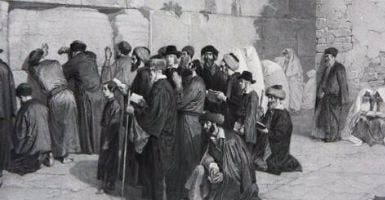Bereishit 5780
In this week’s Parsha, Hashem rebukes Kayin for the murder of his brother Hevel:
“What have you done? The voice of your brother’s blood cries out to Me from the ground!” (Bereishis 4:10)
This rebuke is cited by the Mishna in Sanhedrin (37a) that details the grave warnings that are given to witnesses who appear before Beis Din to testify in capital cases. These warnings stress how precious human life is:
“You should know that capital cases are unlike monetary cases. Regarding monetary cases [if a person has unlawfully taken money belonging to somebody else] he may return the money and that will atone for his sin. But regarding capital cases [if a person causes another person’s death], his blood and the blood of his descendants is attributed to him forever [he is guilty both for his death and that of all the person’s potential descendants, and there is no way that he can return them]. We find as such regarding Kayin who killed his brother, as it says (Bereishis 4): “The blood (“Demei”) of your brother is crying out”. It doesn’t say “Dam Achicha” [in the singular], but rather “Demei Achicha” [in the plural] which includes both his blood and the blood of his descendants… For this reason, may was created alone, to teach that the Torah considers anybody who causes the loss of one Jewish person as though he had destroyed an entire world. And [conversely] anybody who saves the life of one Jewish person is considered by the Torah as if he had saved an entire world.”
In this Mishna, Chaza”l convey two perspectives on the importance of every Jewish life. First, a Jewish life is considered to be an entire world. This is derived from the fact that man was created alone, which indicates how Hashem created a world for even one person. This remains the case even when there are millions of Jews who populate the world.
Second, every person has the potential to beget an entire family and dynasty. Causing his death may, God forbid, prevent all of those future lives. Saving his life, on the other hand, may save many generations of people[1].
In light of the above, we can well appreciate the heavy responsibility that rests on those who are occupied with life-saving treatment. Naturally, not every doctor dedicates the majority of his time to questions of life and death, but a significant number of disciplines in the medical field grapple with these questions on a regular basis. “Should this patient be operated upon now, or at a later date?” “What is the correct diagnosis based on these tests?” “Will this patient be able to tolerate the treatment?”
A doctor who is familiar with the Halachic literature will know that the Torah places enormous importance on the value of life, as exemplified by the rule that Shabbos should be desecrated for even the most remote chance of saving a life. Regarding a patient who is not expected to live more than a few months, there is a discussion among the Poskim whether to allow him to undergo surgery that may cure him but at the risk of immediate death due to the procedure. This is a classic dilemma in medical ethics, but it is also a Halachic question that stems from the urgent need to protect and preserve every moment of life. Similar discussions exist regarding end-of-life issues – such as whether to prolong the lives of terminal patients who are suffering immensely or are dependent upon life-sustaining treatment. The fear of wrongly or inappropriately shortening a life underlines all of the Halachic deliberations in this realm.
However, while this approach does ensure that life and death issues are treated with due care, it has the potential to make medical practitioners fearful of a wrong decision. When faced with difficult decisions, they may deliberate too long and be unable to reach a conclusion as they are burdened with the weight of the issue. Despite their competence and expertise, they may also abdicate their responsibility and leave the decision to others.
The Mishna in Sanhedrin, cited above, having described the dire warnings addressed to witnesses in capital cases, then describes how the Beis Din would reassure them, so that truthful witnesses will not be scared off and decide not to testify:
Perhaps you will say, “Why do we need all of this trouble?” [In other words, being that causing a person’s wrongful death is such a grave sin, perhaps we should be concerned that even though we are certain that he is liable to the death penalty, perhaps we erred]. But the Torah says, “and he is a witness, either he saw or he knew – if he does not relate his testimony, he shall bear his sin” (Vayikra 5:1). And if you will say, “Why should we be liable for this person’s death?[2]” But the Torah (Mishley 11:10) says, “but when the wicked perish there is glad song”.
We shall soon see that these concerns are also relevant to doctors who are about to make complicated decisions and who are scared that they will err. On the one hand, they must appreciate the enormous importance of human life, but on the other hand they are obligated to act responsibly and seriously, without fear, in order to provide the best possible treatment according to their judgment.
- The Torah Relies on You
As in other fields, it is often the case that the hesitation or indecision due to fears about the risks of a procedure can cause more damage than those risks themselves. A doctor should be confident that his years of training and practice have given him the proficiency and the necessary medical experience to make difficult decisions. If he also confers with other physicians and arrives at a logical conclusion, he should not fear the results of his treatment. He should make the decision and act as best as he can. As President Roosevelt famously said, “the only thing we have to fear is…fear itself – unreasoning and unjustified terror which paralyzes needed efforts to convert retreat into advance.” In general, when the only thing preventing the coming to a decision is fear, that is more damaging than the feared result.
A doctor should know that this is his field of expertise and his acts are ratified by the Torah. These are the words of the Ramban (Toras haAdam, cited by the Tur, Y.D. 336):
R’ Yishmael taught, [the Torah says] “and he shall surely heal” – from here we learn that a doctor has permission to heal. He shall not say, “Why do I need the trouble? – Perhaps I will err and will accidentally kill somebody”. However, he must be immensely careful as appropriate for life and death situations… therefore [the Torah] comes to teach us, that he [the doctor] has permission to heal, and that it is a Mitzva, and included in Pikuach Nefesh, and a person who acts swiftly is praiseworthy, and if he refrains from doing so – he is a spiller of blood.
We see from these words of the Ramban that the concerns of a doctor are legitimate but the Torah nonetheless directs him not to fear. He has permission to act and is expected to act swiftly without fear, though with “immense care as appropriate for life and death situations”.
- The Torah Indemnifies Against Claims Due to an Erroneous Decision that was Made Responsibly
If, God forbid, a doctor mistakenly makes a wrong decision in the course of medical treatment and causes harm to a patient, he is immune from legal claims. Though in general a person is liable for any damage he causes, even if it was due to an Ones (circumstances beyond his control), nevertheless, because of Tikun haOlam (enactments by the Chachamim for the good of the world) he is exempt (Minchas Bikurim, Tosefta Gittin 3:13). Without this enactment, people would be wary of studying and practicing medicine. Moreover, every patient knows that all types of medical treatment carry some level of risk.
According to the Ramban (Toras haAdam, Sha’ar haSakanah), a doctor who causes damage is still obligated biYeday Shamayim to compensate the patient. This is based on the Tosefta (Bava Kama 6:6 and ruled by the Shulchan Aruch Y.D. 336:1). However, the Ran (Sanhedrin 84b) rules that he is completely exempt as he is considered “Anus” (victim of an Ones).
All of the above applies to a true error. However, if he did all that was expected of him – including examining all aspects of the case carefully and acting according to the standard of care (in a manner that other doctors would act in the same circumstances), but erred in a diagnosis or in the treatment he provided, then, if his mistake was reasonable (such that other doctors might also have erred similarly) and there was no reason for him to have consulted with somebody more expert than him (or that an expert’s conclusion would have been the same as his was), the Poskim agree that he has not sinned at all and is exempt from damages of any kind. In the pithy line of the Aruch haShulchan (Y.D. 336:2) “Shigegas haRofei Kavanas haBorei” – “the mistake of a doctor is the intention of the Creator”, or, as the Prisha (Y.D. 336:7) puts it, “he did not kill him (the patient) – rather God wanted him to die”[3].
- A Doctor Should Consult with his Colleagues
The Gemara in Kiddushin (82a) famously says “The best of doctors [go to] Gehinom”. Many commentators explain that this refers to doctors who are arrogant and who think that they know everything and that they needn’t consult with anybody else. From this week’s Parsha, we may derive that this is poor conduct. Before Hashem created Man, he “consulted” with the angels, as the Torah (Bereishis 1:26) says “and God said, ‘Let us make Man in Our image, as Our likeness.” The expression “Let us make Man” is addressed to others, and Chaza”l derive from this that Hashem consulted with the angels. Rashi (ad. loc.) explains:
Let us make Man – although [the angels] did not assist [God] in [man’s] creation, and there is room [on the basis of this phrase] for the heretics to claim supremacy [by saying that the Torah itself indicates that many gods participated in the creation of man], the verse did not refrain from teaching us proper conduct and the trait of humility, that the greater one should consult with and take permission from the lesser one. If it had written, “I shall make Man”, we would not have learned that He was speaking with His court, rather, we would have thought, with Himself [i.e. we would have thought that He was addressing Himself, and we would not have learned that the greater one should consult with the lesser one]. The rebuttal to the heretics is written next to it [i.e. next to the verse which gives them room for error]: “And He created man” [which uses the singular verb]; it did not write “and they created.”
Humility and Derech Eretz are important tools when making involved decisions. Humility may make a doctor review a patient’s chart again, consult with more junior doctors or students and to carefully examine the relevant medical literature.
- Taking Advice from more Senior Doctors
Thus far, we have seen that a doctor is advised to consult even with doctors more junior that him. However, when doing so, he must make the final decision. If he is still training, or has encountered a problem that is not in his realm of expertise, it is Halachically forbidden for him to make important decisions without consulting a more senior doctor or one more experienced in the field. This is in fact the standard practice in hospitals – a doctor in training may not make important decisions without consulting a senior doctor or by bringing up the question in the daily rounds.
However, in outpatient clinics and day medicine or short-stay units, doctors will often make decisions without conferring with more senior staff who are available on site. It would be preferable for them to take the trouble to ask the opinion of those more senior to them if they are available. The source for this is the Tur (Y.D. 336):
However, a person should not be involved in medical treatment unless he is knowledgeable and knows the field and the practices and there is nobody senior to him. But somebody who is not familiar with the nature of this work, and, similarly, if there is somebody senior to him, should not be involved with it at all. This is a Kal vaChomer from all other laws and rulings of the Torah. For how may a person rule on matters of possible life and death where there is somebody there who is senior to him? If [in these circumstances] he involves himself with it at all, he is a spiller of blood.
There is a fascinating Teshuva of the Shevus Ya’akov (3:75)[4] who was asked to provide his opinion regarding a complicated medical decision and gave a number of important principles that are based on these words of the Tur:
This is a question from an expert doctor regarding a certain patient who was sick with an illness that was near to taking his life. All of the doctors agreed that he would certainly die within a day or two but they proposed that there was one more treatment that could possibly heal him. However, the opposite could also transpire –if he were to undergo this treatment and it wouldn’t succeed, God forbid, he would die immediately within an hour or two. Is it permitted to attempt this treatment or should we be concerned for the small amount of life he has left (“Chayei Sha’ah) and “sit and do nothing”?
Answer: Since this matter is clearly Dinei Nefashos (a matter of life and death) one needs to deliberate extremely carefully, researching thoroughly in Shas and Poskim. For anybody who causes the death of even one Jewish person etc. and “anybody who saves one life, it is as if he has saved an entire world.”
At this point, the Shevus Ya’akov discusses whether one should be concerned for a person’s Chayei Sha’ah when there is a chance of him gaining Chayei Olam (long-term survival). Having concluded that one may risk Chayei Sha’ah to gain Chayei Olam he writes:
However, a doctor should not just simply do this. Rather, he should be extremely deliberate in the matter, and clarify it with the expert doctors in the city. He should act based on a clear majority[5] and the agreement of the wise man of the city.
Regarding the situation today where doctors frequently treat patients where more senior doctors are available, see footnote[6].
In conclusion, the practice of medicine is exceedingly demanding and intense. A normal consequence of dealing with questions that significantly affect people’s lives on a regular basis is the erosion of the sense of gravity of one’s actions and decisions. It is difficult to work for with the constant burden of feeling that every patient is a world of his own and to relate to him accordingly. The great number of cases that doctors have to assume can easily affect their ability to consider each patient as tremendously important and to dedicate adequate time to each of them. In order to meet the expectations of Halacha, doctors must expressly appreciate that each patient is a world of his own and that great responsibility rests on their shoulders.
In order to ensure that he has the correct approach and perspective, a doctor must base his decisions upon appropriate and thorough consideration of each case, conferring with others (even those junior to him) and seeking the wisdom of experts in the field. Above all, he should be able to make decisions without fear and without concern for what might occur. A doctor has been granted permission to heal, and once that permission has been granted, it is his obligation and duty. He should Daven that he does not err in his work and that he will receive Divine assistance so that his treatments and interventions will be successful.
[1] Interestingly, while the text of our Gemaros states “anybody who causes the loss of one Jewish person … and anybody who saves the life of one Jewish person” the text in the majority of manuscripts does not contain the words “Jewish”. The Rambam (Hilchos Sanhedrin 12:3) cites this Gemara as applying to all of the human race, who all descend from Adam haRishon – “anybody who causes the loss of one person”. However, in Hilchos Rotzeach (1:16) the Rambam seems to apply this Gemara only to Jewish people.
[2] In other words, it would be preferable to violate the sin of not bearing testimony than risk wrongly causing someone’s death (Rashi Sanhedrin ibid.)
[3] See also Shevet haLevi (10:294) who discusses the case of a doctor who misreads an x-ray, missing a small fracture. Rav Wosner zt”l writes that it is well known that these sorts of mistakes occur even when the person examines the x-ray very carefully. Therefore, “Ein l’Dayan Ela Ma sheEinav Ro’os” (a person can only make a conclusion based on what his eyes have seen), and he is exempt from damages. (See also Tashbeitz 3:82 for a similar ruling). See also the Sefer Halacha uRefua 2, 5741 p287 onwards, for Rav Yitzchak Zilberstein Shlit”a’s summary of the topic.
[4] Written by Rav Yaakov Reischer zt”l, one of the great Poskim of the late 18th century
[5] “at least double [those that forbid] as we are concerned about the Kalei haDa’as (flippant or frivolous, i.e. those who would permit without serious analysis)”
[6] Rav Yitzchak Zilberstein Shlit”a (Shabbos Shabboson, footnote 75) cites his father-in-law (Rav Elyashiv zt”l) who held that a doctor may rule on clear and obvious matters even in the presence of more senior doctors just as a Rav may rule on clear and obvious Halachos even if a more senior Rav is available. The Gemara that forbids it is only relevant to matters that have not previously been ruled upon and need to be derived from and compared to existing Halachos. Doing so requires a certain level of scholarship and should therefore not be attempted when a more senior person is available. The same applies to doctors. If a patient’s diagnosis is unclear, a doctor should not attempt to diagnose him before consulting with an expert.
Rav Elyashiv zt”l also maintained (see the Sefer Zikaron for Rav Betzalel Zolti zt”l, Moriah 5747) that in modern times, all doctors are considered “Mumchim” (upon completing their medical studies and training), and, as far as common illnesses and symptoms are concerned, there is no significant difference between specialists and “regular” doctors. Therefore. there is no reason to prevent or forbid a doctor from treating patients even when a more expert doctor is available. This is also the conclusion of the Tzitz Eliezer.
Moreover, not everybody has access to appointments with or treatment from specialists. Therefore, the “regular” doctor is not considered to be providing treatment in a place where a specialist is available. However, all of the above only applies to routine cases. Where the case is more complicated, he should certainly consult with a more expert doctor. Rav Moshe Feinstein zt”l (Igros Moshe C.M. 74:5) writes in this regard that occasionally a less experienced doctor will make a more accurate diagnosis and recommend a more appropriate treatment than a senior physician. Moreover, a person does not necessarily merit to be healed by any specific doctor. Therefore, if the matter is urgent and one doesn’t have the ability to consult a specialist, one should rely on the doctor who is available.















Add comment